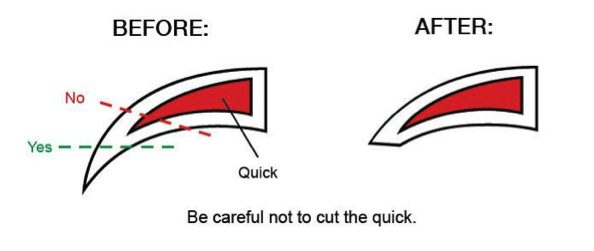Editor’s Note: Healthy Paws is a column sponsored and written by the owners of Clarendon Animal Care, a full-service, general practice veterinary clinic and winner of a 2017 Arlington Chamber of Commerce Best Business Award. The clinic is located 3000 10th Street N., Suite B. and can be reached at 703-997-9776.
Taking your pet in for a nail trim — it sounds so simple, and for many dogs and cats it is. But, for others, it is truly a terrifying experience. For many pets that are anxious or resistant to nail trims it is the handling of their feet that really drives them bananas; for others, they resist the pressure from the clippers. Others get anxious coming into the veterinary hospital or grooming facility, setting them up for a negative experience. For others, it may have been a previous experience that has set them up for fear and anxiety with future nail trims.
While it is true that in many cases a nail trim could be done with enough restraint, this often is not in the best interest of the pet — as future attempts will likely only elicit more severe anxiety and stress, making them that much more difficult and even dangerous to the pet. Our philosophy, and that of many veterinary hospitals that embrace the Fear Free/Low Stress philosophies is to never struggle with a pet for an elective procedure such as a nail trim. Therefore, we often recommend that our clients work on desensitization of their pets at home. In this process, the pet comes to associate the anxiety-provoking procedure with a positive experience.
Veterinary behaviorist Dr. Sophia Yin was a wonderful resource for all things behavior-related in dogs, and has a wonderful (and rather impressive!) video demonstrating how to counter-condition and desensitize a dog to nail trims linked here.
In some cases, behavioral modification enough is not alone and sedation (ranging from very mild to heavy) is needed to safely perform a nail trim. This may include “pre-medicating” with mild anti-anxiety medications prior to the visit or short-acting injectable sedatives administered under the supervision of a veterinarian.
In other cases, pets may do better at home with nail trimming. Many owners are concerned about trimming the nails too close to the “quick,” but with a few precautions this can be easily avoided. Your pet’s veterinarian or groomer will also likely be willing to demonstrate their technique in person.
If nail trims are a source of stress for your pet (and you as their caring owner!), we recommend consulting with your pet’s veterinarian about desensitization techniques and coming up with a plan that works best for your pet.



